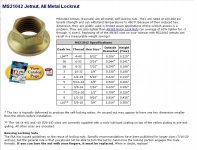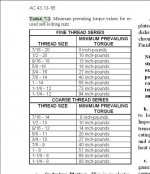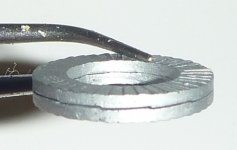Offline
There was some discussion of this before and I ran across this statement by Pegasus on their site. See bottom paragraph in screenshot.
I found the FAA citation listing the minimum Prevailing Torques for reusing locknuts. Prevailing Torque is the amount required to move the nut on the threads once the locking mechanism is fully engaged. Not the same as Final Torque, which is tightening it against the object.
FWIW - did a little test: 2+ foot-pounds were required to tighten a dry, new 1/4-28 nylok or stover locknut on a new bolt.


I found the FAA citation listing the minimum Prevailing Torques for reusing locknuts. Prevailing Torque is the amount required to move the nut on the threads once the locking mechanism is fully engaged. Not the same as Final Torque, which is tightening it against the object.
FWIW - did a little test: 2+ foot-pounds were required to tighten a dry, new 1/4-28 nylok or stover locknut on a new bolt.



 Hi Guest!
Hi Guest!

 smilie in place of the real @
smilie in place of the real @
 Pretty Please - add it to our Events forum(s) and add to the calendar! >>
Pretty Please - add it to our Events forum(s) and add to the calendar! >> 



